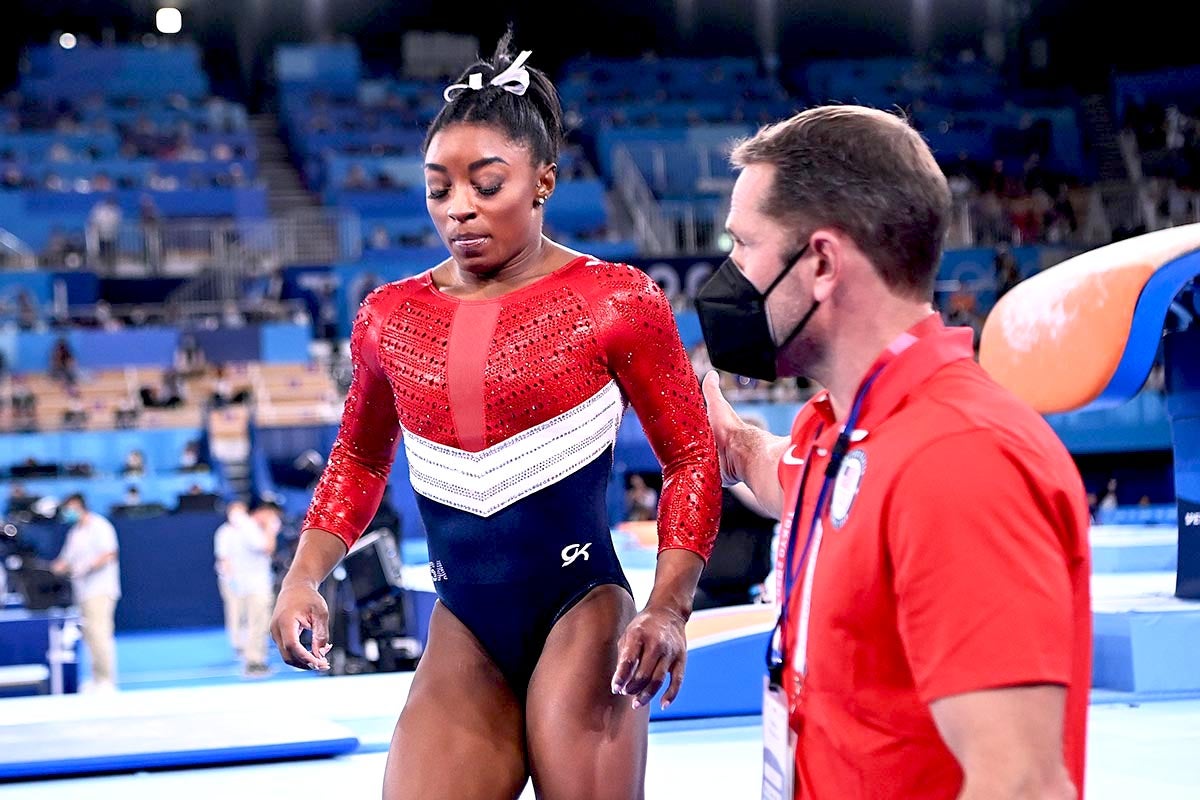Simone Biles dared to prioritize herself. For a Black female athlete, that’s a powerful choice to make
‘It just sucks when you’re fighting with your own head,’ said the star athlete after she pulled out of one of the Olympics finals events


Your support helps us to tell the story
From reproductive rights to climate change to Big Tech, The Independent is on the ground when the story is developing. Whether it's investigating the financials of Elon Musk's pro-Trump PAC or producing our latest documentary, 'The A Word', which shines a light on the American women fighting for reproductive rights, we know how important it is to parse out the facts from the messaging.
At such a critical moment in US history, we need reporters on the ground. Your donation allows us to keep sending journalists to speak to both sides of the story.
The Independent is trusted by Americans across the entire political spectrum. And unlike many other quality news outlets, we choose not to lock Americans out of our reporting and analysis with paywalls. We believe quality journalism should be available to everyone, paid for by those who can afford it.
Your support makes all the difference.This morning, star Team USA gymnast Simone Biles withdrew from one of the finals events of the Tokyo Olympics, saying, “I have to focus on my mental health and not jeopardize my health and well-being.” Biles had stumbled during her initial move on the floor, and left the mat before returning to confirm that she was pulling out. “Physically, I feel good. I’m in shape,” she said after her exit during an appearance on the Today show. “Emotionally, it varies on the time and moment. Coming to the Olympics and being head star isn’t an easy feat.”
Biles also noted during her withdrawal that she was inspired by Naomi Osaka, who withdrew from the French Open this year citing her mental health, and was met with a considerable amount of criticism. Biles’ team went on to win a silver medal without her, while Osaka was ousted in the Olympic tennis third round.
If you have something to say about Biles and Osaka taking breaks for themselves that aren’t just well-deserved, but very clearly needed, I’d love to see if you’re capable of performing on the same physical or mental levels as them. Are you waking up every morning to train? Restricting your diet to the healthiest foods on the market? Sacrificing the fun of your twenties to represent your country in an international sports competition? I didn’t think so.
Mental health should be at the forefront of our national priorities — and while teammates have been supportive of Biles, social media is full of criticism for her and Osaka. Indeed, the unique pressures experienced by young Black women called on to represent America are worth noting and examining. No matter how talented these women are, too many have suffered for those talents. Consider how Sha’Carri Richardson was disqualified for testing positive for marijuana — a drug few could argue was athletically “performance-enhancing” — earlier this year. Richardson lives in a state where recreational cannabis is legal, and she told a reporter that she had smoked after hearing that her biological mother had died. This week, US soccer star Megan Rapinoe was able to speak publicly about her use of CBD during training, and there were no apparent career repercussions.
There is a long history here. Many will remember the treatment of Caster Semenya, the South African Olympic sprinter who was subject to painful scrutiny after she was found to have naturally high testosterone levels after routine tests. This year, two Namibian sprinters have been disqualified for the same reasons. Time and time again, Black women athletes are raised up then torn down in public for reasons mostly beyond their own control. And let us not forget that when they step off the Olympic stage, these athletes still face the same dangers as all Black women: Serena Williams, one of the world’s most decorated athletes, almost died giving birth to her child. Black women have much higher instances of death during labor than their white counterparts.
This is what we mean when we say racism is systemic: it’s built into the rules, whether they’re the rules of the hospital or the rules of the Olympic Games. And it runs so much deeper than many people realize.
Rather than criticizing those like Biles who withdraw rather than destroy their mental health, we should be upholding such young Black women as inspirations. The normalization of speaking about mental health, taking time off from work if needed, and refusing to be put in situations that cause excessive anxiety — like Osaka choosing to not speak to the press — is important. If the pandemic teaches us anything, it should be teaching us to choose ourselves and our health over hustle culture. Doing so should not be controversial, whether you work in an office or onstage for your country.
Health is, or at least should be, holistic. You can’t play your best game if you’re not at your best. Biles knew this: she messed up her first physical challenge of the Olympics because she wasn’t in the right mental space to perform.
During her withdrawal announcement, Biles said, “We have to protect our body and our mind… It just sucks when you’re fighting with your own head.” Sports fans are understanding about not forcing their favorite athletes to work through a torn ACL or a sprained ankle. So why shouldn’t the same logic be applied to preserving their career through ensuring they stay mentally on form?
Join our commenting forum
Join thought-provoking conversations, follow other Independent readers and see their replies
Comments